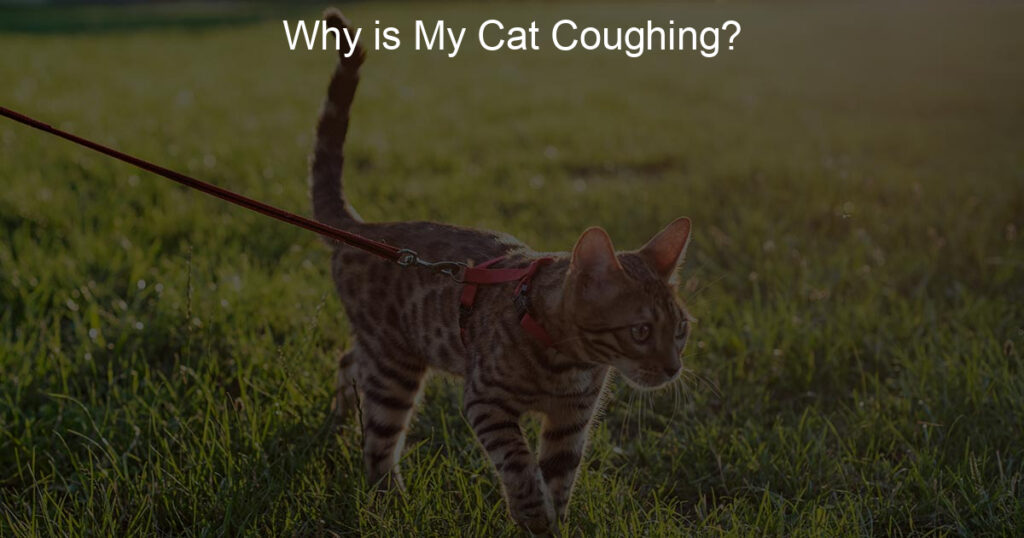If you’ve ever heard your cat coughing and wondered, “Why is my cat coughing?”, then you know how alarming it can be. Coughing in cats can indicate a range of causes from just a short-term respiratory illness to something more serious like an infection or heart disease.
In this post, we’ll explore the potential reasons why your kitty may be sneezing and provide some helpful advice on what steps you should take if they start displaying signs of coughing.
Is it normal for a cat to cough?
Many cat owners may experience the alarming sound of their furry companion coughing. The answer to whether or not it is normal for a cat to cough can vary from pet to pet – so if your cat does it often, you should consult a vet. Generally speaking, occasional coughing among cats is normal in some cases and can be caused by hairballs or respiratory infections.
Some cats may also hack due to allergies or parasites. In any situation where you are unsure if their coughing is out of the ordinary, seeking medical advice is key to keeping your beloved feline healthy and happy.
What should I do if my cat is coughing?
If your cat is coughing, it can be a scary thing! Coughing can be caused by many things and getting to the root of the issue is key. First, take your cat to the veterinarian for an exam. Depending on the severity of the coughing, X-rays and other tests may need to be done as well. The veterinarian can then determine what kind of treatment will work best for your kitty.
In some cases, over-the-counter medications might help clear up the cough; in more serious cases, antibiotics or other medications administered under a vet’s care may be required. Lastly, make sure you keep up with regular grooming appointments; this will ensure a healthy coat and minimize hairballs that can contribute to coughing.
When should I worry about my cat’s cough?
While coughing is generally nothing to worry about in cats, since it’s a normal way for them to get rid of things like hairballs and other foreign items, if your cat’s cough continues for more than a day or two, it could signal an underlying respiratory ailment.
It is best to be aware of any sudden changes in your cat’s activity level, eating habits, or litter box usage as well as signs such as sneezing, labored breathing, or discharge from the eyes or nose – especially if the coughing persists.
If you suspect something might be wrong with your cat, you should make an appointment with your veterinarian right away. Early detection can help keep minor conditions from becoming more serious so taking any abnormalities seriously is always recommended.
Why does my cat keep coughing but nothing comes out?
If your cat keeps coughing but nothing comes out, it can be concerning to watch. It could mean your cat is trying to dislodge a hairball or an item it may have swallowed. Sometimes cats can cough up the mucus in their lungs and windpipe if they are suffering from allergies, illness, or trauma.
In some cases, this coughing behavior could also indicate something more serious such as asthma, bronchitis, heart or lung disease, or even tumors of the airways. To ensure your pet’s health and safety, it is best to take your cat to a trusted veterinarian for a thorough check-up.
What does cat asthma sound like?
Cat asthma can be a very frightening experience, both for the cat and its owner. When cats are experiencing an asthma attack, it often sounds like they are trying to cough up a hairball or their breathing becomes labored and noisy. It may also sound like wheezing or the attempt to bring in more air followed by a slightly high-pitched whistling sound.
If your cat is exhibiting any of these symptoms, it is impious must take the vet as soon as possible. Asthma attacks in cats can be severe and should not be taken lightly. Early diagnosis is key for getting your furry friend feeling better quickly!
Conclusion
In closing, coughing in cats is far from normal, but depending on the cause there are options you can choose from to help your sick kitty. If your cat is coughing for more than two days, be sure to take them to the vet for a check-up as soon as possible. The earlier you catch and address the issue, the better their chances are of a regular and speedy recovery.
All cats are unique and most illnesses require specific treatments tailored to their individual needs. Your vet will be able to identify the underlying cause of your pet’s condition and provide you with the resources and advice needed to get them back on track in no time!












